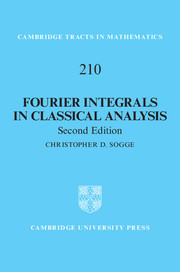Book contents
- Frontmatter
- Dedication
- Contents
- Preface to the Second Edition
- Preface to the First Edition
- 0 Background
- 1 Stationary Phase
- 2 Non-homogeneous Oscillatory Integral Operators
- 3 Pseudo-differential Operators
- 4 The Half-wave Operator and Functions of Pseudo-differential Operators
- 5 LP Estimates of Eigenfunctions
- 6 Fourier Integral Operators
- 7 Propagation of Singularities and Refined Estimates
- 8 Local Smoothing of Fourier Integral Operators
- 9 Kakeya-type Maximal Operators
- Appendix: Lagrangian Subspaces of T*Rn
- References
- Index of Notation
- Index
Preface to the Second Edition
Published online by Cambridge University Press: 11 May 2017
- Frontmatter
- Dedication
- Contents
- Preface to the Second Edition
- Preface to the First Edition
- 0 Background
- 1 Stationary Phase
- 2 Non-homogeneous Oscillatory Integral Operators
- 3 Pseudo-differential Operators
- 4 The Half-wave Operator and Functions of Pseudo-differential Operators
- 5 LP Estimates of Eigenfunctions
- 6 Fourier Integral Operators
- 7 Propagation of Singularities and Refined Estimates
- 8 Local Smoothing of Fourier Integral Operators
- 9 Kakeya-type Maximal Operators
- Appendix: Lagrangian Subspaces of T*Rn
- References
- Index of Notation
- Index
Summary
In the twenty plus years since I wrote the first edition of this book there have been many important developments in harmonic and microlocal analysis. For instance, very recently there has been seminal work on multilinear methods through the breakthrough of Bennett, Carbery and Tao [1], the related oscillatory integral estimates of Bourgain and Guth [1] and the decoupling estimates of Bourgain and Demeter [1]. These works and others have led to many applications, including the proof of sharp local smoothing estimates. I have chosen not to include these, partly because they represent a fast moving target, but moreover because they would have added considerably to the book's length. My goal for the first as well as the current edition was to provide a self-contained but by no means exhaustive introduction to harmonic and microlocal analysis.
To this end, I added two new chapters. One, which ties in with the earlier material on Fourier integral operators, presents Hörmander's theory of propagation of singularities and uses this to prove the Duistermaat–Guillemin theorem, which is a triumph of microlocal methods, saying that for generic manifolds one can obtain an improvement in the error term for the Weyl law. This chapter includes material that perhaps should have been included in the first edition and augments the microlocal analysis portion of the book. I also added a new chapter on what could now be considered classical harmonic analysis. It concerns results related to the Kakeya conjecture, including the “bush” method of Bourgain and the “hairbrush” method ofWolff for obtaining Kakeya and Nikodym maximal estimates, as well as the relationship between the Fourier restriction problem and the Kakeya conjecture. Most of the results presented in this chapter were being developed as the first edition of my book was being completed.
I also added a bit of new material to the chapters in the first edition, including Bourgain's counterexample to certain oscillatory integral estimates, which showed that Stein's oscillatory integral theorem was sharp, and I also made a few corrections to the earlier text. This turned out to be a more difficult undertaking than I anticipated due to the fact that the first edition of the book was written in the age of floppy disks and although I had saved the output files on several of them, I did not do the same for the source files for the first edition.
- Type
- Chapter
- Information
- Fourier Integrals in Classical Analysis , pp. xi - xiiPublisher: Cambridge University PressPrint publication year: 2017



